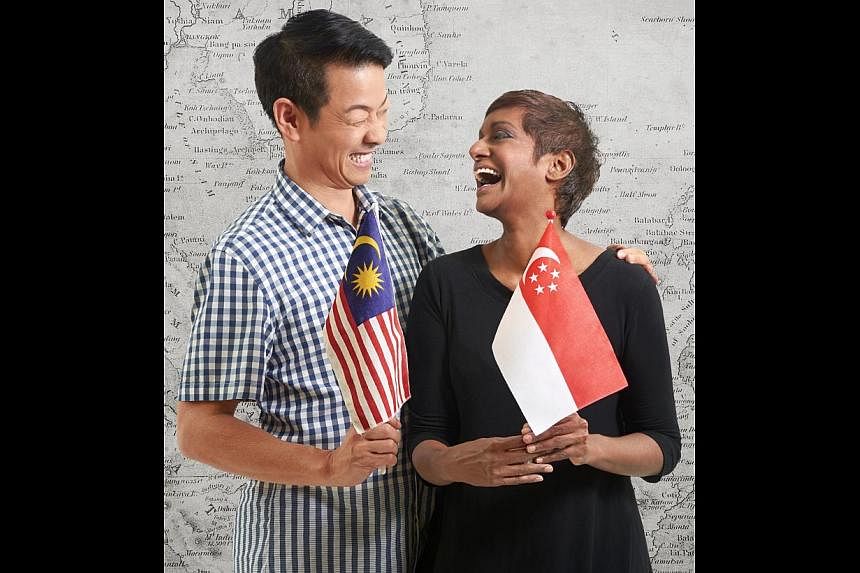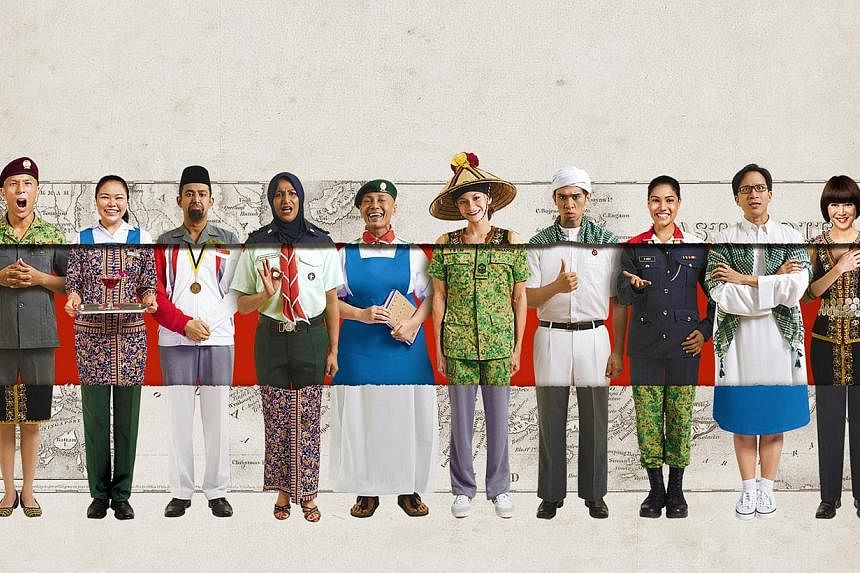Wild Rice is building a theatrical Causeway between Singapore and Malaysia by way of their upcoming production, Another Country.
The theatre company's inter-country collaboration is divided into two parts: Five Singaporean actors, directed by Ivan Heng, will tackle a selection of Malaysian texts and materials; another five Malaysian actors, directed by Jo Kukathas, will take on a spread of Singapore literature.
The production, which opens at Kuala Lumpur's Damansara Performing Arts Centre on Thursday before travelling to Singapore's Drama Centre Theatre on June 25, promises to be a celebration of the counterpoint between the two countries - how they form a pleasing and important contrast to each other, even a strange sort of harmony.
The Malaysian pieces were selected by Malaysian playwright Leow Puay Tin and the Singaporean ones by home-grown playwright Alfian Sa'at. They will be performed by Singapore actors Sharda Harrison, Gani Karim, Lim Yu-Beng, Janice Koh and Siti Khalijah Zainal; and Malaysian actors Ghafir Akbar, Sharifah Amani, Anne James, Alfred Loh and Iedil Putra.
Lim quotes from one of the pieces, Lee Kok Liang's novel Flowers In The Sky: "I think Puay Tin's selection speaks of 'a one-ness in the harmony of opposing sounds'. It may appear, at times, that there is a cacophony - but it's also a symphony."
Heng says: "The project invites both companies to walk in each other's shoes. And not only that, they also express each other's thoughts to each other's audiences, and then to their own.
"It's a profound and beautiful project because you are different, but there's still something which is the same - I think that is a common humanity."
It was an interesting role reversal of sorts for actress Siti Khalijah, who realised halfway through rehearsals that in this Malaysian context, she was in the racial majority, which she found a "weird" experience. She had grappled with issues such as playing the race card or how those in power might misuse their status.
She says: "I grew up in a generation where Malaysia was already another country, knowing that I have cousins in Malaysia but we don't visit them often; that Singapore is expensive and Malaysia is cheap; that food is better in Malaysia, that there are more halal options and that there are more Malay people in Malaysia.
"It has always been 'Another Country' for me, but another country that I like to escape to. And I like the fact that we're different."
This is not the first time that Wild Rice has taken on a project of such proportions. A decade ago, the work Second Link (2005) was the first incarnation of this structure of performance, performed to critical acclaim in Singapore and Malaysia.
Leow had also selected the Malaysian work for Second Link, calling her selection Tikam-Tikam: Malaysian Roulette, and emphasising the importance of randomness and chance.
This time, it is titled Tikam-Tikam: Malaysia @ Random 2. The pieces will be performed in random order every night, meaning no two performances will be alike.
It is interesting to note the works and artists both Singapore and Malaysia have "claimed" as their own. One of Leow's choices was Singaporean Stella Kon's Emily Of Emerald Hill - which was performed in Malaysia for the first time in 1984, with Leow as the very first Emily, before it started playing in Singapore.
She says: "It's very hard to pin people down, who is Malaysian and who is not, when they are Malaysian and when they are not. Things are fluid now.
"There's a lot of shared history between Singapore and Malaysia, so there's no point contesting who owns Sejarah Melayu (the Malay Annals) or Hikayat Abdullah (a 19th-century literary work). I've dipped into that."
Leow has also included, for instance, excerpts of essays by the late Malaysian theatre director Krishen Jit, who worked often in Singapore. There is also an excerpt from a memoir by Malaysian writer Shirley Lim, who had taught at the National University of Singapore.
Kukathas says of this randomness: "It fits well with what Malaysia is all about. There is disorder, things come from left field, it's hard to control a kind of cultural identity."
As a sort of response to that, she will be staging the work which Alfian has selected in chronological order: "I feel whenever I go to Singapore, there's a lot of discussion about Singaporean identity, almost to the point of obsession.
"So I felt that in order to create a portrait of Singapore, I need to find out some sort of journey to put things together. I've tried to find connections."
Alfian's selection begins with Sang Nila Utama's founding of Singapore as recorded in the Malay Annals, "which is something I think not many people have encountered before - many think it's oral literature or some legend passed down through generations, but it's actually a segment written in classical Malay".
The rest of his selection then takes the audience through various stages of history, including decolonisation, nationalism and socialism. He has included everything from letters written to the newspapers in the 1920s to songs written by the left-wing students of the 1950s.
There are also other pieces with a more literary bent, such as poems by Cyril Wong and Lee Tzu Pheng, and a short story by Claire Tham, which deals directly with Malaysia from the perspective of a Singaporean writer.
Alfian says: "I think there are bits in the selection which will make the audience realise that we were culturally rich as a people and, over the years - whether it was due to social-hygiene campaigns, moral panic or counterculture threats - we've perhaps become a bit more mono-dimensional."
He adds: "I think the Singapore that I want to present is one that is diverse - that can accommodate different voices, including those from political dissidents, Peranakans who speak Baba Malay, Eurasian-fronted rock bands, Anglophone Indian schoolteachers with perfect diction and dance hostesses."
Leow was impressed by the depth of understanding shown by both groups of actors.
"One of the things we all crave is understanding, to be understood. We love it when people understand us," she says.
"So it was very moving, the first time I watched the Singapore actors doing the texts from Malaysia - because they showed so much understanding. "Some things had a certain distance between them but they really worked at closing the gap. It was wonderful."
Follow Corrie Tan on Twitter @CorrieTan



